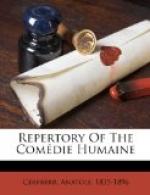BONAPARTE (Napoleon), Emperor of the French; born at Ajaccio, August 15, 1768, or 1769, according to varying accounts; died at St. Helena May 5, 1821. As First Consul in 1800 he received at the Tuileries the Corsican, Bartholomeo di Piombo, and disentangled his countryman from the latter’s implication in a vendetta. [The Vendetta.] On the evening of the battle of Jena, October 13, 1806, he was met on that ground by Laurence de Cinq-Cygne, who had come post haste from France, and to whom he accorded pardon for the Simeuses and the Hauteserres, compromised in the abduction of Senator Malin de Gondreville. [The Gondreville Mystery.] Napoleon Bonaparte was strongly concerned in the welfare of his lieutenant, Hyacinthe Chabert, during the battle of Eylau. [Colonel Chabert.] In November, 1809, he was to have attended a grand ball given by Senator Malin de Gondreville; but he was detained at the Tuileries by a scene—noised abroad that same evening—between Josephine and himself, a scene which disclosed their impending divorce. [Peace in the House.] He condoned the infamous conduct of the police officer Contenson. [The Seamy Side of History.] In April, 1813, during a dress-parade on the Place du Carrousel, Paris, Napoleon noticed Mlle. de Chatillonest, who had come with her father to see the handsome Colonel d’Aiglemont, and leaning towards Duroc he made a brief remark which made the Grand Marshal smile. [A Woman of Thirty.]
BONAPARTE (Lucien), brother of Napoleon Bonaparte; born in 1775; died in 1840. In June, 1800, he went to the house of Talleyrand, the Foreign Minister, and there announced to him and also to Fouche, Sieyes and Carnot, the victory of his brother at Montebello. [The Gondreville Mystery.] In the month of October of the same year he was encountered by his countryman, Bartholomeo di Piombo, whom he introduced to the First Consul; he also gave his purse to the Corsican and afterwards contributed towards relieving his difficulties. [The Vendetta.]
BONFALOT, or BONVALOT (Madame), an aged relative of F. du Bruel at Paris. La Palferine first met Mme. du Bruel in 1834 on the boulevard, and boldly followed her all the way to Mme. de Bonfalot’s, where she was calling. [A Prince of Bohemia.]
BONFONS (Cruchot de), nephew of Cruchot the notary and Abbe Cruchot; born in 1786; president of the Court of First Instance of Saumur in 1819. The Cruchot trio backed by a goodly number of cousins and allied to twenty families in the city, formed a party similar to that of the olden-time Medicis at Florence; and also, like the Medicis, the Cruchots had their Pazzis in the persons of the Grassins. The prize contested for between the Cruchots and the Grassins was the hand of the rich heiress, Eugenie Grandet. In 1827, after nine years of suing, the President Cruchot de Bonfons married the young woman, now left an orphan. Previous to this he had been commissioned by her to settle in full, both principal and interest, with




